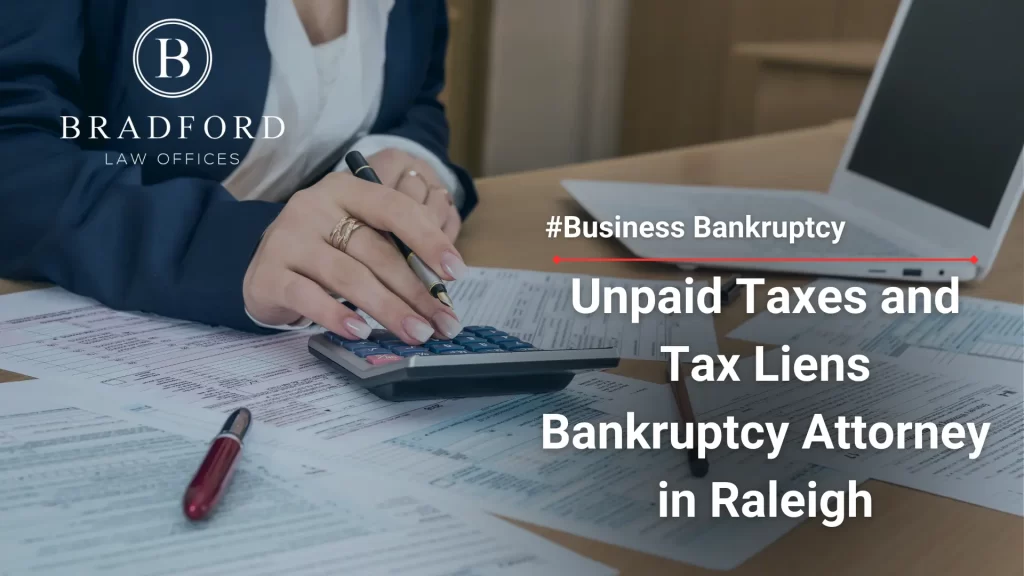
If you face tax liabilities and can’t afford to pay, you should contact Bradford Law Offices immediately. Filing for bankruptcy might be the right solution for you. You can petition the court to discharge or reduce the amount of money you owe, protecting you from future collections actions.
State taxing authorities and the Internal Revenue Service (IRS) have the power to recover taxes owed to them. If you file for bankruptcy, you could protect yourself from the government taking action against you. You could benefit from resolving your tax debt without the pressure of anyone coming after you while you get your finances in order.
The Raleigh business bankruptcy attorney of Bradford Law Offices understand how overwhelming it can be when tax liens and unpaid taxes get in the way of running your business. You worry about how it will affect operations and whether you could lose the company you worked hard to build. Our legal team can represent you in your case and determine the best method for resolving your tax debt.
Call us today at (919) 758-8879 for a free and confidential consultation with an experienced Raleigh unpaid taxes and tax liens bankruptcy attorney.
Understanding Bankruptcy Tax Litigation
As a taxpayer, you could resolve outstanding tax liabilities for your business by filing for bankruptcy. With Chapter 7 bankruptcy, you might be able to discharge certain tax debts, meaning you will never have to pay back the money you owe. However, you can’t discharge all debts. Sometimes, the bankruptcy court will order a debtor to sell certain assets to cover their tax liabilities.
Typically, filing for Chapter 7 bankruptcy requires selling assets to pay back creditors, such as the IRS and state taxing authorities. Resolving a tax dispute could take months or even years. Until then, you might be deprived of your money. If you file before you pay, the bankruptcy court could determine whether the assessed tax liability you contested is the correct amount owed without requiring upfront payment.
Bankruptcy Courts in the United States
Your bankruptcy filing is governed by the federal bankruptcy court of the United States. There are district court divisions in your state where you file for bankruptcy.
A bankruptcy judge presides over the case in bankruptcy court. Under federal law, the district courts have exclusive and original jurisdiction over cases filed under the U.S. Bankruptcy Code. District courts grant bankruptcy courts the authority to handle bankruptcy petitions and other bankruptcy-related matters.
Litigating a bankruptcy case is similar to pursuing a regular case in federal district court. Each side involved in the case has a chance to present evidence, cross-examine witnesses, and request documentation from the opposing party.
However, the bankruptcy judge presides over the matter and draws conclusions. Even if the bankruptcy court holds a trial for the bankruptcy petition, it’s rare for a jury to resolve the issue.
Restrictions on Tax Debt Allowed in Bankruptcy Court
If the debtor or bankruptcy trustee contests or objects to a tax claim, the bankruptcy court can determine the validity of the claim or the amount of money owed.
Additionally, whether certain income tax debts can be discharged depends on whether the debtor met specific requirements before petitioning the court, such as:
- Filing a tax return at least two years before petitioning for bankruptcy
- The IRS hasn’t accused the debtor of fraud
- The tax was due at least three years before filing for bankruptcy
- The taxing authority assessed the tax at least 240 days before the bankruptcy filing occurred
As a business debtor, you must keep track of your income tax returns and tax assessments. The dates you filed will influence whether the bankruptcy court has the authority to discharge those tax debts.
Determining Eligibility for Discharge of Tax Liabilities
The specific circumstances of your situation will determine whether you can clear your obligations to pay unpaid taxes. Filing for bankruptcy could result in the court forgiving, helping you manage, or discharging your tax debt. However, the IRS uses certain criteria to decide if a business owner is eligible for tax forgiveness, such as:
- Tax age – The most recent date taxes should have been filed or were due
- Filed returns – Dates of required tax filings
- Assessment – The date of assessed taxes
- Fraud – Whether fraudulent activity existed in evading paying taxes
Why Choose Bradford Law Offices?

The unpaid taxes and tax liens bankruptcy attorney from Bradford Law Offices has represented clients in Raleigh, NC, since 1996. Our legal team dedicates every available resource to assisting businesses with their cases to discharge or reorganize their debts.
We understand how stressful it can be when you don’t have the finances to pay back the money you owe. When you hire us, we can offer various solutions to get you out of the hole you’re in and get your business back on track.
We believe in fighting for the future of small businesses. Facing unpaid taxes and tax liens is challenging for anyone. We know how much work you put into becoming a successful business owner. Creating a repayment plan or terminating operations might be your only chance of getting out from under the debt you owe. You can count on our legal team to review your financial situation and determine a strategy that might help you reach your desired outcome.
Contact Us
If you’re struggling with unpaid taxes and tax liens, contact Bradford Law Offices today. We’re available 24/7 to speak with you about your case and determine whether we can help. A trusted and knowledgeable Raleigh unpaid taxes and tax liens bankruptcy attorney is ready to file a petition on your behalf to get you on the road to solvency.
Call us at (919) 758-8879 right now for your confidential consultation.